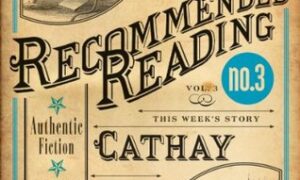 Last Man Off: A True Story of Disaster and Survival on the Antarctic Seas by Matt Lewis
Last Man Off: A True Story of Disaster and Survival on the Antarctic Seas by Matt Lewis
My rating: 3/5 cats



up there in the book info, there is this quote:
“A sinister version of The Perfect Storm . . . Thrilling.” —Sunday Times (UK)
this i do not understand. because The Perfect Storm: A True Story of Men Against the Sea was written by sebastian junger, who was certainly not aboard the andrea gale, View Spoiler » that’s pretty sinister. i mean, in as far as we can assign words like “sinister” to forces of nature like storms which lack intention. this book is written by a survivor of a fishing boat that sank in the ocean near antarctica, who found himself in a lifeboat full of freezing water and frozen corpses and was rescued after three-and-a-half hours, one of only seventeen survivors of the thirty-eight people aboard.
which is terrible, don’t get me wrong, it is a horrifying situation to even contemplate, and i would definitely have been crazed with the fear and cold and uncertainty had i suffered through this, but i still think living to tell the horrible tale is much less unfortunate, less “sinister” than having to have your final moments told by a stranger, sunday times.
i’ve read plenty of books like this one, stories of people surviving against seemingly impossible odds. some of these are written because the author must—to exorcise the demons of their experience. and some are written for the reader—for those who want to experience, vicariously, the disasters that befall the adventurous. this seems to fall into the former category, and it felt more like someone setting the record straight than anything else. so the reader is treated to a story with a little too much finger-pointing and self-serving attitude than something thrilling and harrowing. which makes sense—in the grand tradition of survival literature, there’s just much less story in three-and-a-half hours of peril than, say, shackleton’s year and a half journey back to land.
in 1998, twenty-three year old matthew lewis was employed on the fishing boat suldar havid as an observer—using his marine biology degree to follow a group of fishermen on their three-month expedition from cape town to the antarctic region where they would be harvesting chilean sea bass. his job was to make sure they were compliant with the environmental laws and to catalog their catch, both intentional and accidental. this put him in an awkward outsider position; ostensibly an authority figure present to enforce rules, but as an inexperienced seaman, also a bit of a liability. and while he is able, in this account, to point out his own shortcomings in terms of mistakes he made, he has the luxury of falling back on this inexperience to mitigate his own culpability while feeling quite free to point out the failures of others that led to the tragedy. and that’s a little off-putting, particularly when he calls two crew members “bastards” when he observes them cut the ties on the lifeboat they have boarded alone, instead of waiting for more survivors. this causes the remaining lifeboats to become overcrowded, which exacerbates an already difficult situation, but it seems a bit churlish, considering he later remarks that there may have been perfectly good reasons for them to have prematurely cut the rope, View Spoiler »
there were definitely bad decisions made on the boat that led to its sinking—the greed that prolonged the fishing into the path of a dangerous storm, a lack of safety training and equipment further complicated by language barriers, corners cut with safety regulations and inspections, lack of clear-cut leadership with a captain in title only, a muddled chain-of-command, and a crew lacking cohesion, causing the abandonment of the ship to devolve into a free-for-all.
and it’s perhaps unreasonable of me to be turned off by human pettiness, to have fallen under the hollywood spell that purports endurance pares down a person to pure unjudgmental heroism, free of smugness or grudge-holding, but i’m subject to my own pettiness and this admission, coming shortly after the rescue:
View Spoiler »seems unnecessary. i mean, props to him for admitting that—for owning the pettiness, but it’s a turn-off for the reader.
and there’s more like it.
View Spoiler »i mean, it seems very low to take such pleasure in this. yes, people died. mistakes were made. and maybe alfius’ choice to save his documents wasted enough time to have made a difference. but maybe not. survivors who have the luxury of relaxing with a beer taking such delight in the further misfortunes of others rankles, and reads more like jealousy than justice.
incidentally, the one who threw the bag overboard was also the one who, in the initial confusion of lifeboat-boarding, finding bags full of food sachets and water—neither of which we saw ourselves as needing yelled, “Throw them away, get rid of the weight!” which as it happened, they did not need, but that could have very easily been one of those shortsighted decisions that led to further loss of life. i’m just saying—hindsight is great for blaming, but it isn’t useful for much except making oneself feel better. it would be like me saying “you want the boat to be less heavy? throw some of those corpses overboard!” when i know they were too weak and paralyzed by cold and fear to do so. blame is easy. advice is easy. understanding another person’s motivations is harder.
there is one moment where he seems to address this:
View Spoiler »i feel like he was maybe just too close to the material and not a sophisticated enough writer to understand that the appeal of this kind of story is not to “absolve matt lewis,” but to simply and objectively describe the situation. while he doesn’t paint himself as the unsung hero, he does kind of lean that way—for all his inexperience, he was the only one who was clearheaded enough to organize the lifeboat situation, eulogize the dead, assign blame. and that all may be completely accurate, but it reads a bit self-serving. and this is perhaps why we need the sebastian jungers of the world.
it’s not a bad book, but i was never able to shake the author’s voice in order to become fully immersed in the narrative, which is something i think you need to do with books like this to really enjoy.
read my book reviews on goodreads







